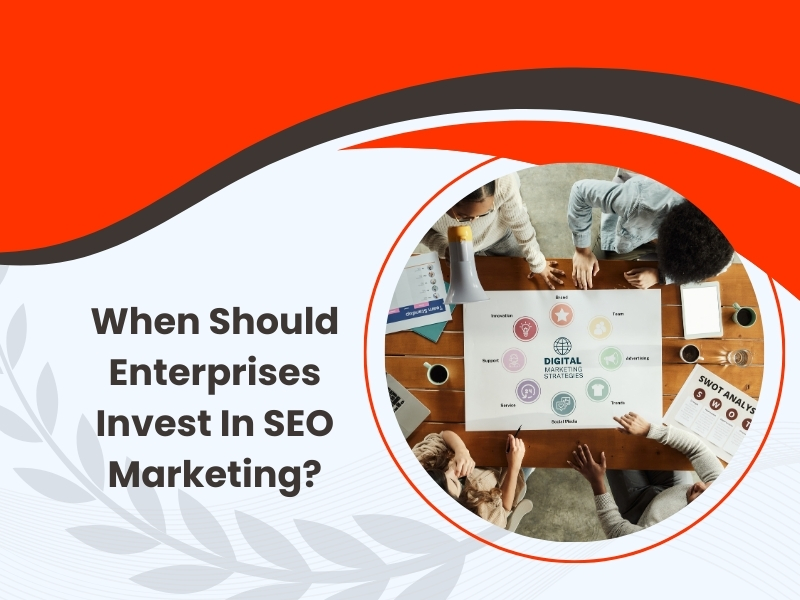A solid online presence is crucial for enterprises striving to stand out in a competitive marketplace. As consumer behaviour increasingly shifts towards online interactions, businesses must consider the best strategies to enhance visibility and attract potential customers. One of the most effective approaches is Search Engine Optimisation (SEO) marketing. However, knowing when to invest in SEO can be challenging. This guide explores the significance of SEO marketing for your enterprise, including how to assess your current online status and signs that indicate a need for investment. It also delves into the long-term benefits, the ideal timing for budgeting, measuring effectiveness, and the following steps to take after deciding to invest.
What is SEO marketing, and why is it important for enterprises?
SEO marketing aims to optimise a website’s search engine ranking, increasing its visibility on platforms like Google. It involves keyword research, on-page optimisation, link building, and technical SEO.
Why is SEO marketing important for your enterprise? Here are some key reasons:
- Increased organic traffic: SEO helps attract more visitors to your website without paid advertising.
- Improved brand visibility: A higher ranking in SERPs can enhance your brand’s visibility.
- Enhanced user experience: SEO focuses on creating a website that is easy to navigate and provides valuable content.
- Higher conversion rates: SEO can lead to more leads, sales, and conversions.
- Long-term ROI: While SEO may require an initial investment, it can provide long-term benefits.
How can you assess your current online presence before investing in SEO?
Before investing in SEO, evaluating your current online presence is essential. Here are some factors to consider:
- Website traffic: Analyse your website’s current traffic and identify your top traffic sources. Pay attention to the growth or decline of traffic over time and the demographics of your visitors.
- Search engine rankings: Check your website’s rankings for relevant keywords. Use tools like Google Search Console to track your rankings and identify keywords driving traffic.
- Competitor analysis: Research your competitors’ SEO strategies and performance. Identify their strengths and weaknesses, and determine how you can differentiate yourself.
- User experience: Evaluate your website’s usability and design. Test your website on different devices and browsers to ensure a seamless user experience.
- Mobile optimisation: Ensure your website is mobile-friendly. Mobile optimisation is crucial as more people are using smartphones to browse the internet.
What are the signs that indicate your enterprise needs SEO investment?
If you’re experiencing any of the following issues, it might be a sign that your enterprise needs SEO:
- Decreasing organic traffic: A decline in organic traffic can indicate SEO problems.

- Low search engine rankings: If your website is not ranking well for relevant keywords, SEO can help.
- High bounce rate: A high bounce rate suggests visitors need help finding what they want.
- Lack of leads or sales: SEO can help generate more leads and sales.
- Negative online reputation: SEO can help improve your online reputation and address negative reviews.
What are the long-term benefits of investing in SEO for your enterprise?
Investing in SEO can provide numerous long-term benefits, including:
- Sustainable growth: SEO can drive steady and sustainable development for your enterprise.
- Improved brand authority: A robust online presence can enhance your brand’s authority and credibility.
- Increased customer satisfaction: SEO can improve the user experience and increase customer satisfaction.
- Competitive advantage: SEO can give your enterprise a competitive edge.
- Return on investment: While SEO may require an initial investment, it can offer a significant return over time.
When is the best time to allocate a budget for SEO marketing initiatives?
The best time to allocate a budget for SEO marketing initiatives is when you’re ready to invest in long-term growth and improve your online visibility. Here are some factors to consider:
- Business goals: Align your SEO budget with your overall business goals.
- Competition: Assess the level of competition in your industry and allocate accordingly.
- Resources: Consider your available resources, including budget, time, and expertise.
- Long-term commitment: SEO is a long-term investment, so be prepared to commit to ongoing efforts.
How can you measure the effectiveness of your SEO investment?
Tracking the effectiveness of SEO investment for businesses is crucial. Here are some key metrics to monitor:
- Organic traffic: Track changes in organic traffic over time.
- Search engine rankings: Monitor your website’s rankings for target keywords.
- Conversions: Measure the number of leads, sales, and other conversions generated through SEO.
- Website engagement: Analyse metrics such as bounce rate, time on site, and pages per session.
- Return on investment: Calculate your ROI for your SEO efforts.

What are the next steps after deciding to invest in SEO marketing?
Once you’ve decided to invest in SEO, here are the following steps:
- Conduct a thorough SEO audit: Assess your website’s current SEO health and identify areas for improvement. This will help you clearly understand your starting point and prioritise your efforts.
- Develop a comprehensive SEO strategy: Create a tailored SEO strategy that aligns with your business goals. Consider your target audience, competitors, and industry trends to create a plan that effectively positions your enterprise.
- Choose the right SEO partner: Select a reputable SEO agency or consultant to assist with your SEO efforts. A skilled partner can provide valuable expertise and guidance throughout the process.
- Implement your SEO strategy: Execute your SEO strategy consistently and monitor progress. This may involve optimising your website’s content, building backlinks, and improving technical aspects.
- Measure and optimise: Track the effectiveness of your SEO initiatives and make necessary adjustments. Regularly analyse vital metrics such as organic traffic, search engine rankings, and conversions to identify areas for improvement and optimise your online marketing strategy accordingly.
By following these steps, you can effectively implement SEO and maximise its benefits for your enterprise.
Elevate your enterprise with Nifty Marketing Australia’s SEO expertise
Are you ready to take your enterprise to the next level with effective SEO marketing? Nifty Marketing Australia can help you achieve your online goals. Our experienced SEO experts will develop a customised strategy to improve your website’s visibility and attract organic traffic. Contact Nifty Marketing Australia today to learn more about our SEO services and how we can help your business succeed.








